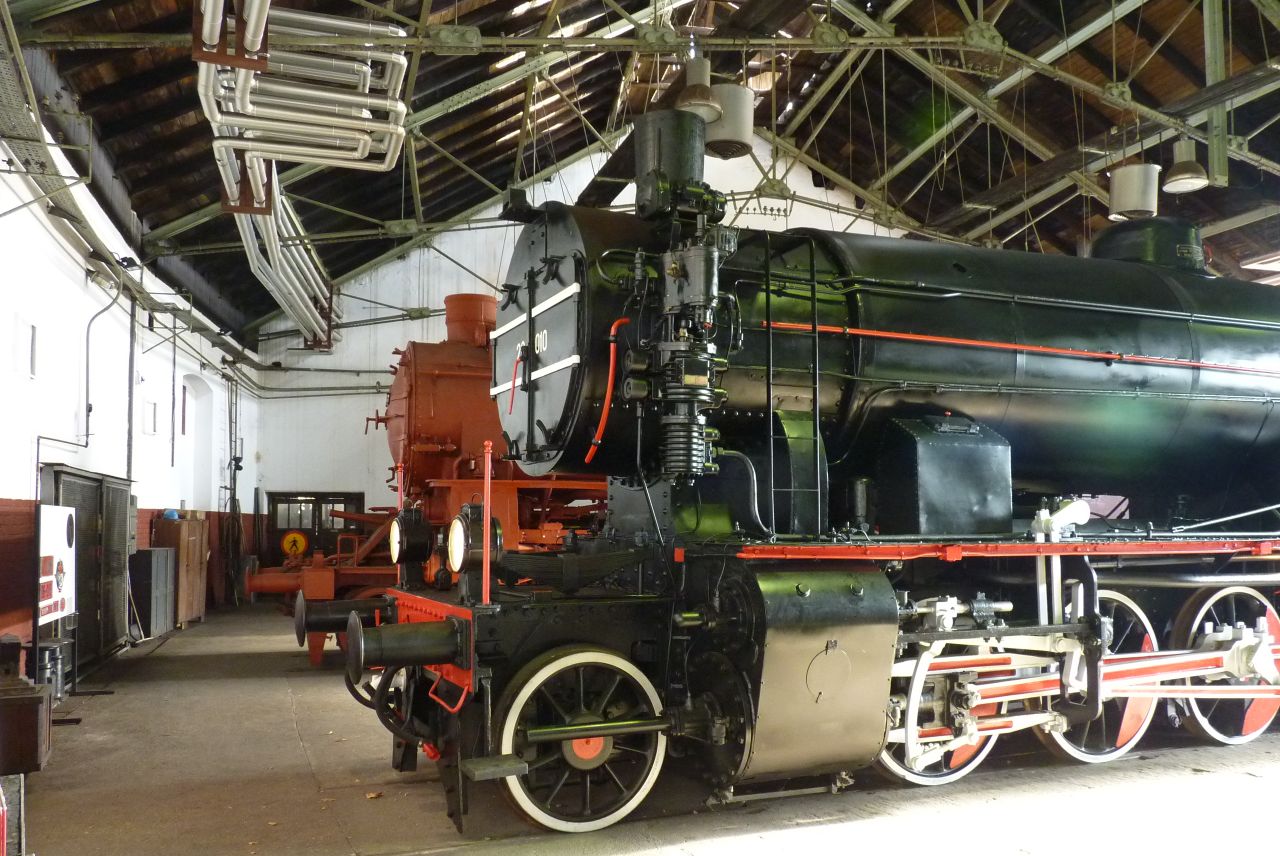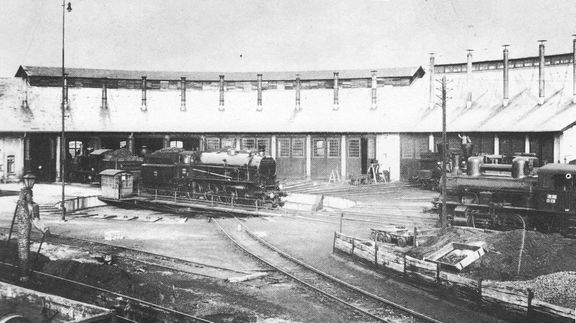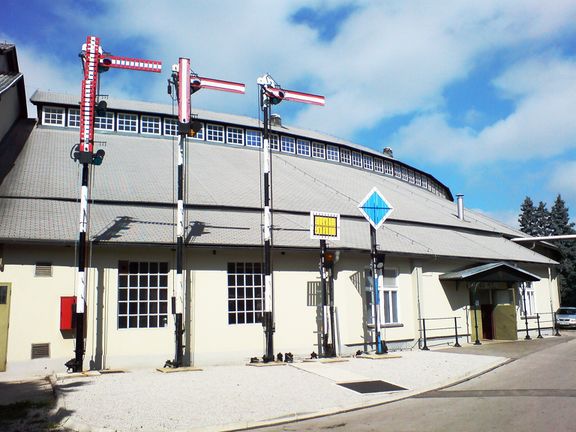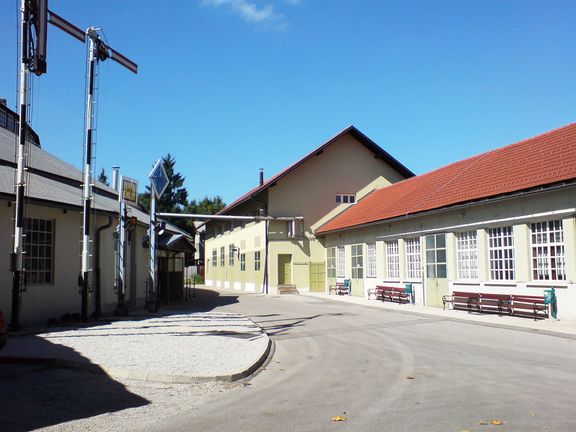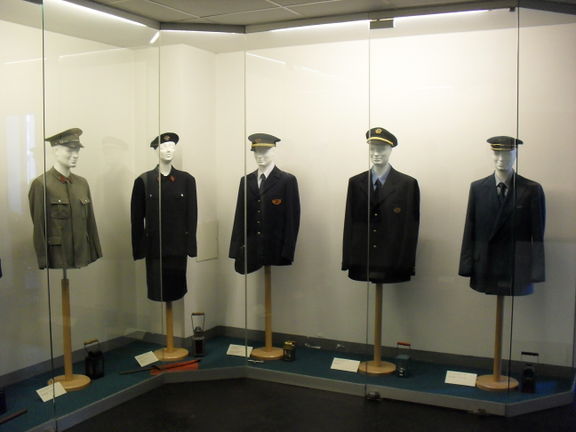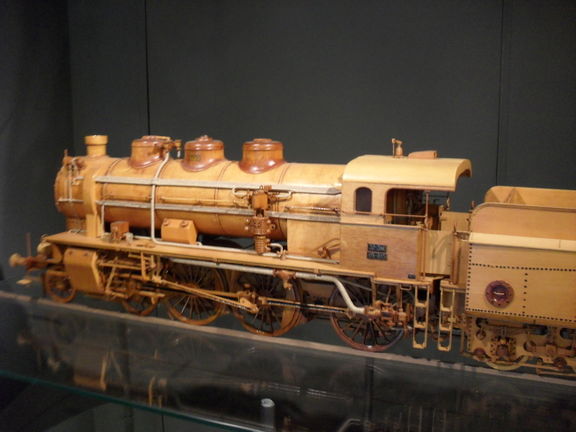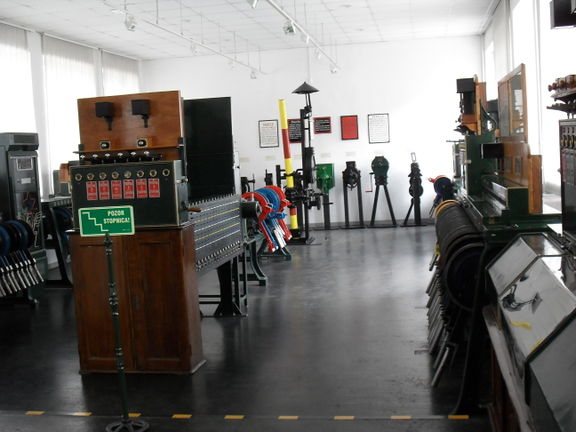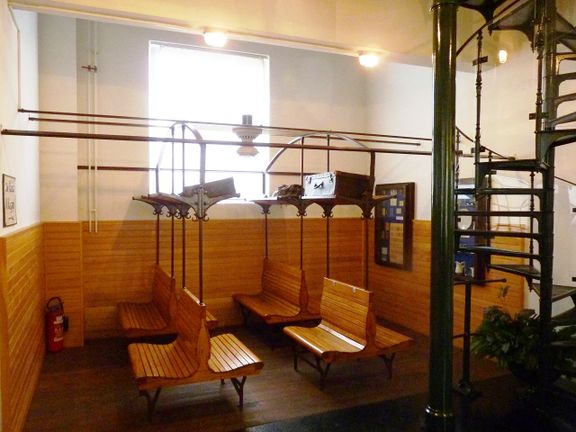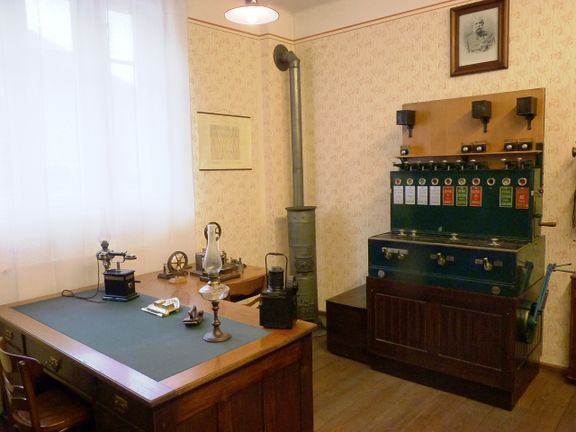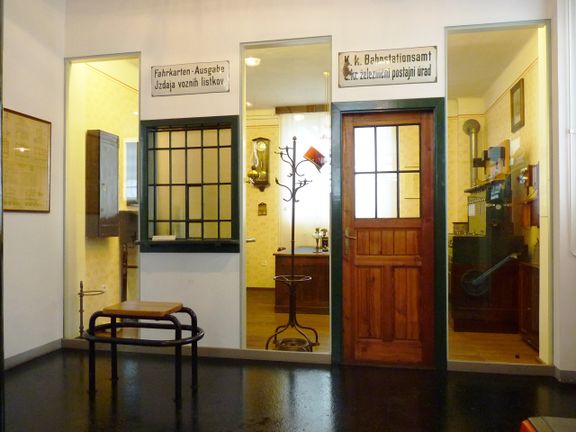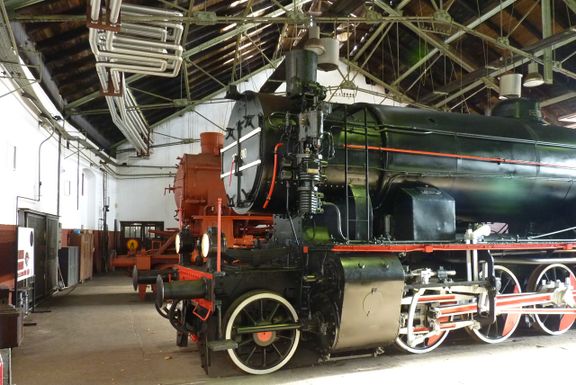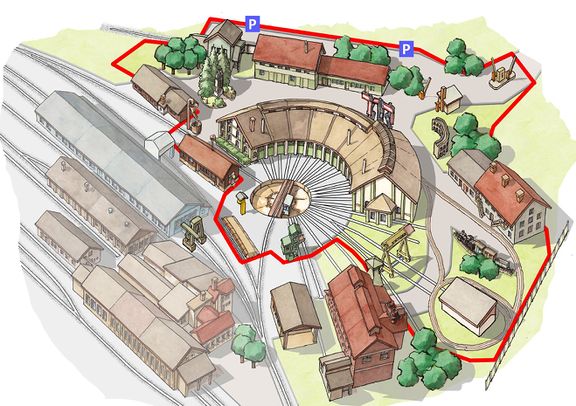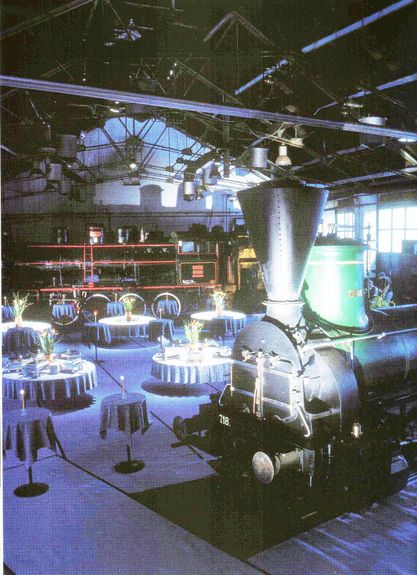Difference between revisions of "Railway Museum of Slovenske železnice"
Anže Zorman (talk | contribs) (Changes per request) |
(English proofreading 1 done) |
||
| Line 31: | Line 31: | ||
{{Teaser| | {{Teaser| | ||
| − | The [[Railway Museum of Slovenske železnice]] displays the railway heritage of Slovenia, as gathered and preserved by the Slovene Railways company and its predecessors. Featuring still functional old steam locomotives set in a former locomotive shed, this is a small yet very curiously laid-out and comprehensive museum. | + | The [[Railway Museum of Slovenske železnice]] displays the railway heritage of Slovenia, as gathered and preserved by the Slovene Railways company and its predecessors. Featuring still functional old steam locomotives set in a former locomotive shed, this is a small, yet very curiously laid-out and comprehensive, museum. |
The museum is divided into two sections: a collection of vehicles (steam locomotives, coaches, wagons and other historic rolling stock) and a permanent exhibition of old apparatuses, tools and other items of heritage relating to various fields of railway history and technology. Thematic temporary exhibitions are held here, as are occasional related events. Additionally, regular rides with [[Transalpina - the Bohinj Railway|historic trains]] are also a part of this enterprise. | The museum is divided into two sections: a collection of vehicles (steam locomotives, coaches, wagons and other historic rolling stock) and a permanent exhibition of old apparatuses, tools and other items of heritage relating to various fields of railway history and technology. Thematic temporary exhibitions are held here, as are occasional related events. Additionally, regular rides with [[Transalpina - the Bohinj Railway|historic trains]] are also a part of this enterprise. | ||
| Line 41: | Line 41: | ||
==Location and venue== | ==Location and venue== | ||
| − | The museum is set at the | + | The museum is set at the former Ljubljana Šiška railway station, just north of the central train station in Ljubljana. The locomotives and carriages are displayed in the "roundhouse", a semicircular shed forming the centrepiece of the depot. Provisionally laid with railway tracks, the shed itself is enlisted on the register of cultural heritage. The rest of the collection is gathered at a separate site next to the roundhouse. |
==Background== | ==Background== | ||
| Line 47: | Line 47: | ||
The museum was formally established in [[established::1981]], when the Slovenian Railways established a museum section to manage its collection of old locomotives and some other historic artefacts, consciously collected since the 1960s and stored in a former locomotive shed that now houses a part of the museum. | The museum was formally established in [[established::1981]], when the Slovenian Railways established a museum section to manage its collection of old locomotives and some other historic artefacts, consciously collected since the 1960s and stored in a former locomotive shed that now houses a part of the museum. | ||
| − | In 1991 the institution was renamed the Railway Museum of Slovenske železnice, focusing on the exhibition of 10 locomotives (out of the 60 they possess). In 1996, marking the 150th anniversary of the advent of railways in Slovenia, the permanent exhibition was enriched with another display, this one with somewhat smaller railway artefacts. In 1999 the roundhouse was renovated and in 2004 a new exhibition building was opened to the public. | + | In 1991, the institution was renamed the Railway Museum of Slovenske železnice, focusing on the exhibition of 10 locomotives (out of the 60 they possess). In 1996, marking the 150th anniversary of the advent of railways in Slovenia, the permanent exhibition was enriched with another display, this one with somewhat smaller railway artefacts. In 1999, the roundhouse was renovated and, in 2004, a new exhibition building was opened to the public. |
{{Wide Image|Railway Museum 1935 The former former boiler room.jpg}} | {{Wide Image|Railway Museum 1935 The former former boiler room.jpg}} | ||
| Line 53: | Line 53: | ||
==Collection== | ==Collection== | ||
| − | The main vehicle collection is made up of 10 locomotives (one of them | + | The main vehicle collection is made up of 10 locomotives (one of them dates back to 1861). However, there are also 50 other vehicles such as carriages and light auxiliary rail vehicles once used by permanent way supervisors and maintenance personnel. Both narrow and standard gauge locomotives can be found in the round house, most of them in superb condition. One of the locomotives is fitted for children to explore. |
There are also about 1000 pieces related to permanent way building and maintenance, railway network development, the workings of a railway station and the related communications infrastructure. Maps, illustrations, uniforms, lanterns, telegraphs, radio stations, historic boundary stones (engraved with the individual railway companies' acronyms), clocks and signalling equipment present the railway life and services from the period of the Austro-Hungarian monarchy onward. | There are also about 1000 pieces related to permanent way building and maintenance, railway network development, the workings of a railway station and the related communications infrastructure. Maps, illustrations, uniforms, lanterns, telegraphs, radio stations, historic boundary stones (engraved with the individual railway companies' acronyms), clocks and signalling equipment present the railway life and services from the period of the Austro-Hungarian monarchy onward. | ||
| Line 63: | Line 63: | ||
==Temporary exhibitions and events== | ==Temporary exhibitions and events== | ||
| − | The museum's permanent collection is enriched by thematic documentary and artistic exhibitions that deal with railway history or motifs. For example, an exhibition of old postcards depicting the famous Borovnica Railway viaduct (ruined in WWII) was prepared in collaboration with the Borovnica Historical Society. Similarly, the history of railways in the Prekmurje region was depicted in an exhibition set up together with the [[Lendava-Lendva Gallery and Museum]]. | + | The museum's permanent collection is enriched by thematic documentary and artistic exhibitions that deal with railway history or related motifs. For example, an exhibition of old postcards depicting the famous Borovnica Railway viaduct (ruined in WWII) was prepared in collaboration with the Borovnica Historical Society. Similarly, the history of railways in the Prekmurje region was depicted in an exhibition set up together with the [[Lendava-Lendva Gallery and Museum]]. |
| − | The museum also regularly hosts the model | + | The museum also regularly hosts the model railways' fairs as well as many other events, more often than not intended for children. The roundhouse has also occasionally been used as a venue for independent and alternative culture events such as [[Mladi levi Festival]] and concerts by the group [[The Stroj|the Stroj]]. |
==Heritage train== | ==Heritage train== | ||
| Line 94: | Line 94: | ||
<br><br> | <br><br> | ||
| − | Historical articles on railyway equipment (in | + | Historical articles on railyway equipment (in Slovenian) |
<br><br> | <br><br> | ||
Latest revision as of 17:18, 2 November 2017
-
to
9 Oct 2019
31 Oct 2019
The exhibition Taking the Train Through Slovenia, co-organised by the "Sava" Slovenian Society and "Logarska Valley" Association in Belgrade, supported by the Embassy of the Republic of Slovenia Belgrade,
Location and venue
The museum is set at the former Ljubljana Šiška railway station, just north of the central train station in Ljubljana. The locomotives and carriages are displayed in the "roundhouse", a semicircular shed forming the centrepiece of the depot. Provisionally laid with railway tracks, the shed itself is enlisted on the register of cultural heritage. The rest of the collection is gathered at a separate site next to the roundhouse.
Background
The museum was formally established in 1981, when the Slovenian Railways established a museum section to manage its collection of old locomotives and some other historic artefacts, consciously collected since the 1960s and stored in a former locomotive shed that now houses a part of the museum.
In 1991, the institution was renamed the Railway Museum of Slovenske železnice, focusing on the exhibition of 10 locomotives (out of the 60 they possess). In 1996, marking the 150th anniversary of the advent of railways in Slovenia, the permanent exhibition was enriched with another display, this one with somewhat smaller railway artefacts. In 1999, the roundhouse was renovated and, in 2004, a new exhibition building was opened to the public.
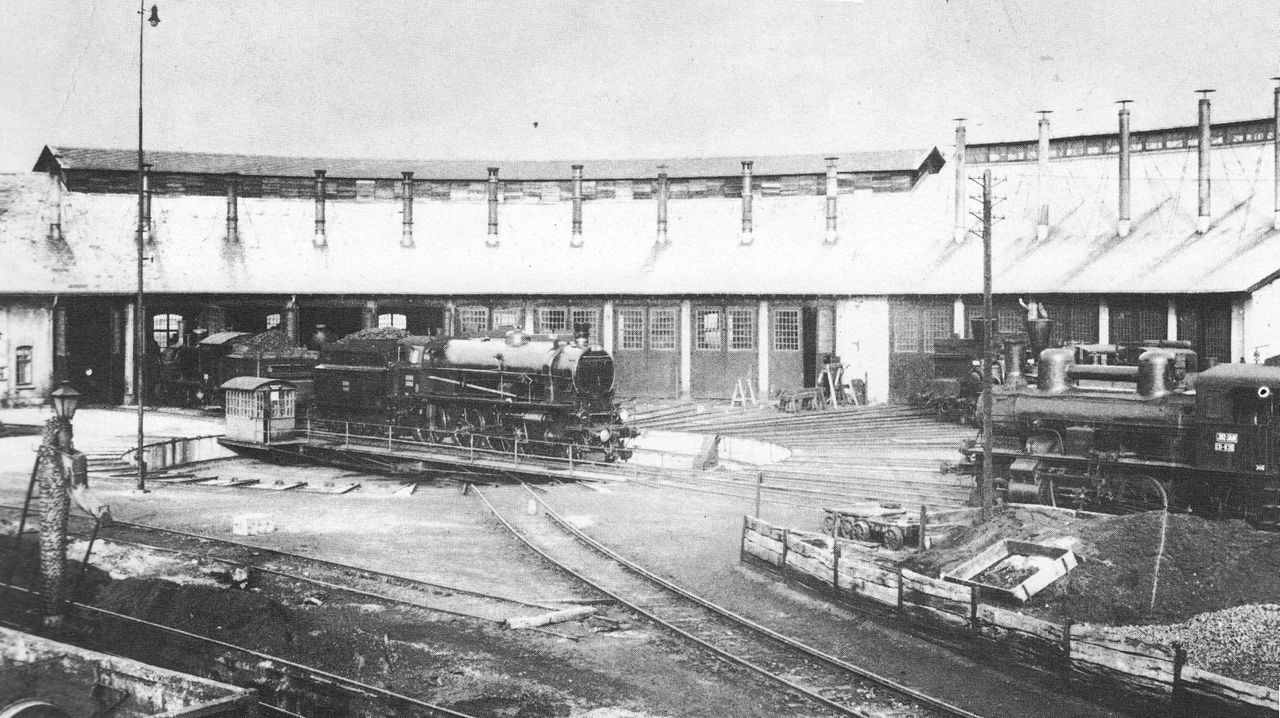 The former boiler room which now houses the Railway Museum of Slovenske železnice collection of vehicles, as photographed somewhere around 1935.
The former boiler room which now houses the Railway Museum of Slovenske železnice collection of vehicles, as photographed somewhere around 1935.
Collection
The main vehicle collection is made up of 10 locomotives (one of them dates back to 1861). However, there are also 50 other vehicles such as carriages and light auxiliary rail vehicles once used by permanent way supervisors and maintenance personnel. Both narrow and standard gauge locomotives can be found in the round house, most of them in superb condition. One of the locomotives is fitted for children to explore.
There are also about 1000 pieces related to permanent way building and maintenance, railway network development, the workings of a railway station and the related communications infrastructure. Maps, illustrations, uniforms, lanterns, telegraphs, radio stations, historic boundary stones (engraved with the individual railway companies' acronyms), clocks and signalling equipment present the railway life and services from the period of the Austro-Hungarian monarchy onward.
Also, a small art gallery presents visitors with works of art dedicated to the railway.
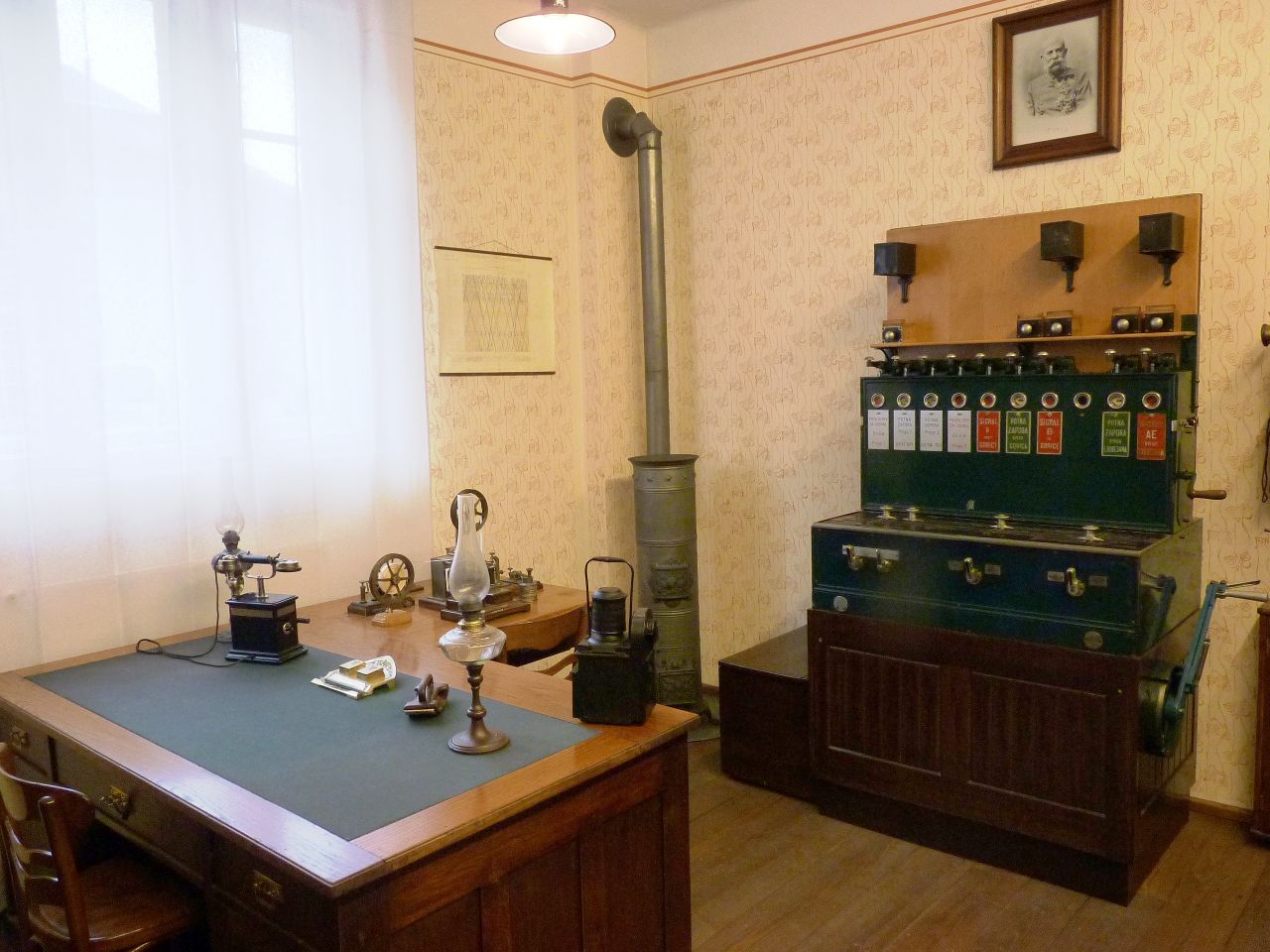 A Railway Museum of Slovenske železnice reconstruction of the old railway bureau, complete with the emperor Franz Joseph's (1830–1916) portrait, 2012
A Railway Museum of Slovenske železnice reconstruction of the old railway bureau, complete with the emperor Franz Joseph's (1830–1916) portrait, 2012
Temporary exhibitions and events
The museum's permanent collection is enriched by thematic documentary and artistic exhibitions that deal with railway history or related motifs. For example, an exhibition of old postcards depicting the famous Borovnica Railway viaduct (ruined in WWII) was prepared in collaboration with the Borovnica Historical Society. Similarly, the history of railways in the Prekmurje region was depicted in an exhibition set up together with the Lendava-Lendva Gallery and Museum.
The museum also regularly hosts the model railways' fairs as well as many other events, more often than not intended for children. The roundhouse has also occasionally been used as a venue for independent and alternative culture events such as Mladi levi Festival and concerts by the group The Stroj.
Heritage train
There are two heritage trains currently operating, both worked by steam locomotives. One traverses the Slovene Alps – the Transalpina - the Bohinj Railway. Another is the weekly heritage train service which runs on Saturdays between the towns of Celje and Imeno, driving through a total of 21 municipalities.
See also
External links
- Railway Museum of Slovenske železnice webpage
- Museum train SŽ 33-037 on YouTube
- A virtual guide to steam locomotives of Railway Museum
- Heritage train in the Celje region webpage
- Heritage train along the Alps webpage
Related Wikipedia articles
Historical articles on railyway equipment (in Slovenian)
- An article on the history of the Slovene Railway logo
- An article on the history of railway uniforms
- An article on the history of railway clocks



